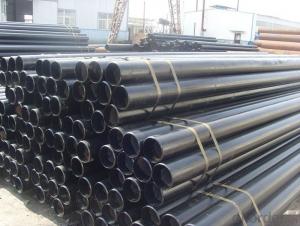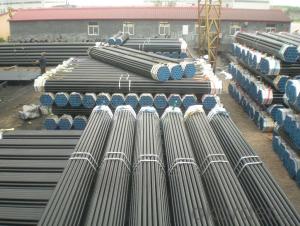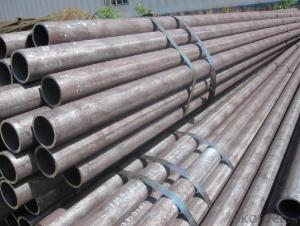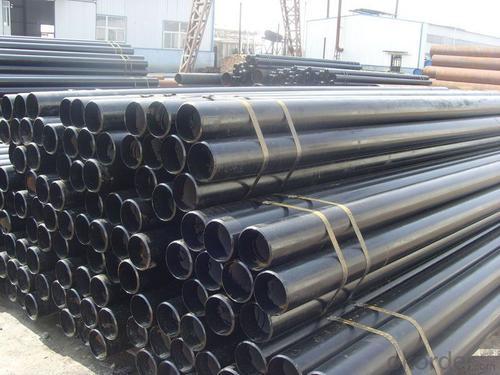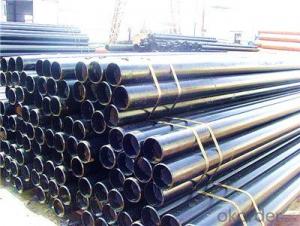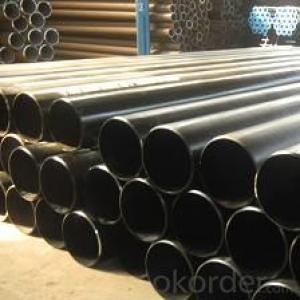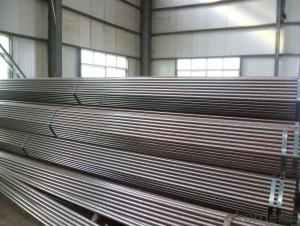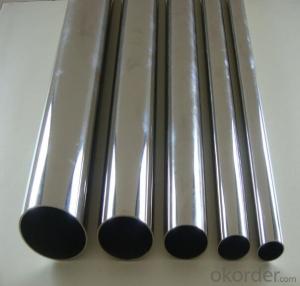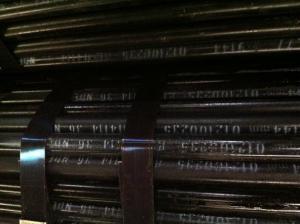Seamless steel tube for sale
- Loading Port:
- Shanghai
- Payment Terms:
- TT OR LC
- Min Order Qty:
- 30 m.t.
- Supply Capability:
- 10000 m.t./month
OKorder Service Pledge
OKorder Financial Service
You Might Also Like
1. Commodity Name: Seamless steel pipe
2. Standrd: API,GB,ASTM,ASME,DIN
3. Quality grade: 10#, 20#, A106B, A53B, API 5L B, Q235, Q345, ST37-2, ST 45, ST52.etc.
4. Dimension:
OD: 1/2"-24"
WT: 2.5-80mm, SCH10~SCH40~XXL
length: 5.8m,6m,8m,9m,12m
5. Technique: Hot Rolled/Cold Rolled/ Cold Drawn
6. application
carbon seamless steel pipes are widely used in gas, water and oil, transpotation;constructions;Bridge,highway,windows of model steel door; building materials;fences;heating facilities Fluid Pipe;conduit pipe,scaffolding pipe.etc.
7. Payment Terms: L/C D/A D/P T/T
8.packing and shipment
Packaged in bundles,as per customers' requirements, it can also bepackagesd as beveled ends, typed marking, black painting, plastic caps protection,woven bags packin
For 20" container the max length is 5.8m; For 40" container the max length is 12m. other options are available based on customer requests. Please discuss when placing orders.
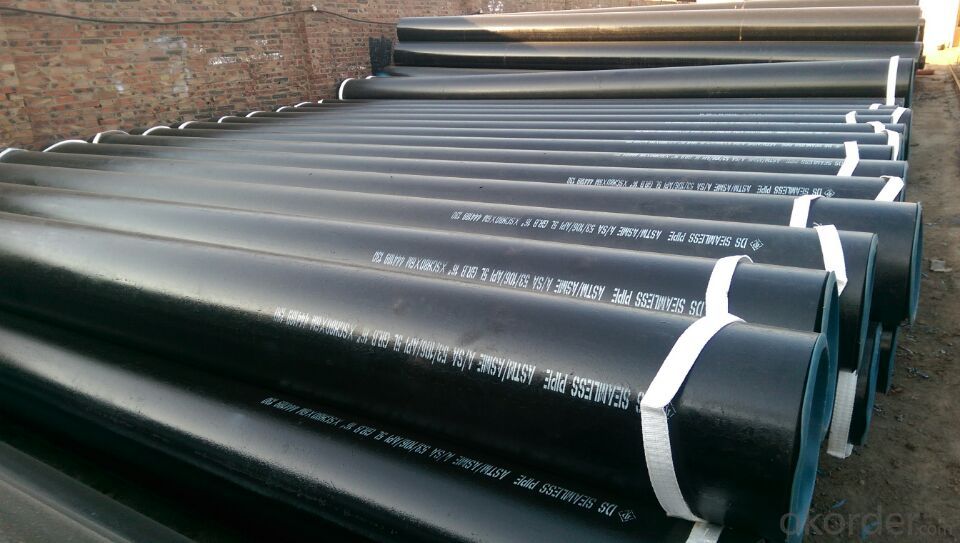
- Q: How are steel pipes protected against galvanic corrosion?
- Steel pipes are protected against galvanic corrosion through various methods including the application of protective coatings such as zinc or epoxy, cathodic protection systems, and the use of corrosion inhibitors.
- Q: How are steel pipes used in the pulp and paper industry?
- Steel pipes are widely used in the pulp and paper industry for various applications. They are primarily used for conveying corrosive chemicals, hot water, steam, and other fluids throughout the production process. Steel pipes provide high strength, durability, and resistance to corrosion, which is crucial in an industry where harsh chemicals are involved. They are used in the transportation of pulp, bleaching agents, and various liquids within the production facilities, ensuring efficient and reliable operations in the pulp and paper industry.
- Q: Difference between cold rolled steel pipe and common steel pipe
- 1, from the dimension accuracy above, cold-rolled steel pipe size is good, high precision2. from the outward appearance, the surface of cold-rolled steel pipe is bright, and the surface of hot rolled steel pipe has obvious oxide skin or red rust
- Q: What are the advantages of using steel pipes in industrial plants?
- There are several advantages of using steel pipes in industrial plants. Firstly, steel pipes are known for their exceptional strength and durability. They can withstand high temperatures, pressure, and heavy loads, making them ideal for transporting various materials and fluids within industrial facilities. Secondly, steel pipes have excellent resistance to corrosion. This is particularly important in industrial settings where the pipes come into contact with corrosive substances or are exposed to harsh environmental conditions. The corrosion resistance of steel pipes ensures their longevity and helps to prevent leaks, which can be costly and hazardous. Additionally, steel pipes offer a high level of versatility. They can be easily fabricated and customized to meet specific requirements, such as different sizes and shapes. This flexibility allows for easier installation and maintenance, reducing downtime and improving overall efficiency in industrial plants. Moreover, steel pipes have a smooth interior surface, which offers several advantages. It allows for efficient flow of materials, minimizing resistance and pressure drop. This smoothness also makes steel pipes less prone to accumulating deposits and contaminants, ensuring a clean and hygienic environment. Furthermore, steel pipes are highly resistant to fire. In industrial plants, where fires can have catastrophic consequences, the fire resistance of steel pipes provides an added layer of safety. Lastly, steel pipes are cost-effective in the long run. Although their initial installation cost may be higher compared to other materials, such as plastic or copper, their durability and low maintenance requirements result in significant cost savings over time. Steel pipes have a long lifespan, reducing the need for frequent replacements or repairs, and their resistance to corrosion and other damages also contributes to cost reduction. In conclusion, the advantages of using steel pipes in industrial plants include their strength, durability, corrosion resistance, versatility, efficient flow, fire resistance, and cost-effectiveness. These qualities make steel pipes a reliable and efficient choice for various applications within industrial facilities.
- Q: What's the actual size of the DN25?
- Steel pipe is not only used to transport fluid and powder solid, exchange heat energy, and manufacture mechanical parts and containers, but also is an economic steel. It can reduce weight and save 20 to 40% of metal by using steel pipe to make building structure, network frame, prop and mechanical support. Moreover, it can realize factory mechanization construction. Using steel pipe to manufacture road bridge can not only save steel, simplify construction, but also greatly reduce the area of coating protective layer, save investment and maintenance cost.
- Q: What are the different methods of measuring the thickness of steel pipes?
- There are several methods of measuring the thickness of steel pipes. One common method is using ultrasonic thickness gauges, which send high-frequency sound waves through the pipe and measure the time it takes for the waves to bounce back. Another method is through magnetic induction, which uses a magnetic field to determine the thickness based on the changes in the field caused by the pipe's thickness. Additionally, there are mechanical methods such as using calipers or micrometers to directly measure the thickness of the pipe.
- Q: What is an electric welded pipe (EFW)? Seek help!
- Pipe and pipe fittings should be suitable for the gap, usually with micro force insertion is appropriate, the gap is too large or too small will affect the quality of the interface.Check the depth of the plug and slip the spigot into the socket and position correctly.
- Q: How are steel pipes used in the manufacturing of structural frameworks?
- Steel pipes are commonly used in the manufacturing of structural frameworks due to their strength and durability. They are used as structural members to support the weight of buildings, bridges, and other infrastructure. Steel pipes are often used as columns, beams, and braces to provide stability and load-bearing capacity to the structures. The pipes are typically welded or bolted together to create a rigid framework that can withstand heavy loads and structural forces.
- Q: Can steel pipes be used for culvert applications?
- Yes, steel pipes can be used for culvert applications. Steel pipes are commonly used for culverts due to their strength, durability, and resistance to corrosion. They are capable of handling heavy loads and can withstand harsh environmental conditions, making them suitable for various culvert applications such as road and railway crossings, drainage systems, and stormwater management.
- Q: How do you measure the thickness of a steel pipe?
- There are several ways to measure the thickness of a steel pipe. One common method is to use a specialized tool called a caliper or micrometer. This tool allows you to precisely measure the diameter of the pipe at various points, and by subtracting the inner diameter from the outer diameter, you can determine the thickness. Another approach is to use an ultrasonic thickness gauge, which uses sound waves to measure the thickness of the pipe. This non-destructive testing method is particularly useful for pipes that are already installed or are difficult to access. Additionally, you can also use a magnetic or eddy current thickness gauge, which relies on the principle of magnetism or electromagnetic induction to measure the thickness of the pipe.
Send your message to us
Seamless steel tube for sale
- Loading Port:
- Shanghai
- Payment Terms:
- TT OR LC
- Min Order Qty:
- 30 m.t.
- Supply Capability:
- 10000 m.t./month
OKorder Service Pledge
OKorder Financial Service
Similar products
Hot products
Hot Searches
Related keywords
